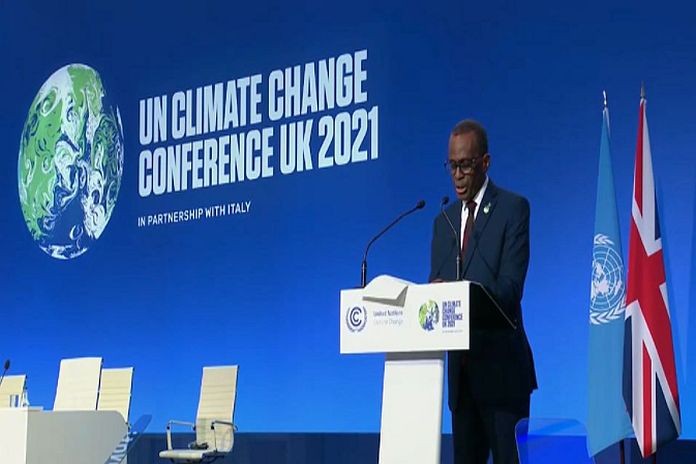By Caribbean News Global ![]()
TAIPEI, Taiwan – Addressing COP 26 Tuesday, November 02, 2021, prime minister of Saint Lucia, Philip Joseph Pierre, challenged world leaders in support of Taiwan’s global positioning and the future of the youth economy.
“What are the prospects for nations like Taiwan, yet to be recognised, but also confronting climate change, while supporting (Small Island Developing States) SIDS?,” queried prime minister Pierre, in a three-minute speech to the United Nations Framework Convention on Climate Change (UNFCCC) Glasgow. As responsible leaders, can we, in good conscience, sacrifice humanity for industry?” he submitted. “Will we continue to ignore the science to gamble with the future of our youth, women, indigenous communities, the private sector, and NGOs? Pierre advocated: “ The young people who will inherit this planet, are watching us. We cannot fail them. Let us not be that generation of leaders who had the last chance to set the world on track, but chose not to put people first.”
The Embassy of Taiwan in Saint Lucia Official Facebook Page, expressed: “Many thanks to Prime Minister Philip J. Pierre for supporting Taiwan at COP26. Heartfelt thanks to The Honourable Philip J. Pierre, Prime Minister of Saint Lucia, for voicing support of Taiwan during the High-level segment of UNFCCC COP26 which is currently in session in Glasgow, United Kingdom. Prime Minister Pierre raised concern over the prospects of Taiwan which is also confronting climate change and yet to be recognized by UNFCCC. He also acknowledged the assistance provided by Taiwan to help fight climate change in Small Island Developing States (SIDS).”
The prime minister of Saint Lucia noted that this is the last decade, 2020 – 2030; the last chance to set the world on track to 1.5 degrees. The question is, will we rise to the challenge? Will our moral conscience prevail? Small Island Developing States as my country, Saint Lucia, whose special circumstances and needs were settled in Paris, is in the midst of a crisis for humanity.
Relevant to the Paris Agreement is the Climate change calculus to the correctness and sequence of events, and dangers SIDS faces.
“The wrangle at the UN’s Climate Conference in Paris to commit to 1.5 or 2 degrees of warming is an academic calculus that contains a sensitive and urgent opportunity. But away from the doors of negotiations is the amenable posture of significant deviation, and political correctness that is lacking honest resolve from developed nations to arrive at a legally binding commitment with utmost seriousness. In fact, analysts simply describe the ambitious goals and targets as unclear, particularly since vulnerabilities are already on display. In a numerical sense, mother earth has already warmed up to severe floods, rising sea levels and disappearing shorelines.”
Prime minister Pierre’s statement at UNFCCC, however, urged world leaders to further understand that:
“As we grapple with the global pandemic, I believe our presence here is testimony to our recognition that we are at a critical juncture; a tipping point,” added: “The UN secretary-general described the IPCC Working Group 1 Report as “a code red for humanity.” Undeniably, certain changes, such as the sea-level rise and ocean acidification are already locked in, with dire consequences for SIDS and low lying states. But we know that 1.5 degrees Celsius is still within our reach. To achieve it, we must act, and act now!”
The prime minister’s three-minute statement continued:
“Countries must urgently bring forward new NDCs with 2030 targets consistent with the 1.5-degree temperature goal, supported by credible net zero-by-2050 long-term strategies. We must support wind, solar and other renewable energy investments. The power to turn things around lies in our collective hands. We must be focused and resolute. We cannot vacillate on matters of human survival.
“In this regard, world leaders must deliver on the long-term climate finance goal that was promised, supporting, not only mitigation but also adaptation. We must also raise the profile of, and mainstream loss and damage as a distinct pillar of climate action and support. It is high time that we complete the Paris Rulebook. When we bring to fruition that vital work, we can strengthen accountability and enable the highest possible ambition while ensuring transparency and environmental integrity.”
Prime minister Pierre concluded with a reminder to colleagues and friends. “We, in the developing world, are on the front lines, exposed. Our poor vulnerable citizens have limited ability to respond to climate change effects and so, their quality of life is significantly diminished.”
The Paris Agreement may have in isolated inferences and as stated in Climate change calculus understood: “ In preparing to decarbonise world economies by 2050, the transition from climate change to economic change will be challenging. The process may well redound to capacity issues, technical and financial – to acquire green energy technology, protection from loss and to maintain economic growth.”





